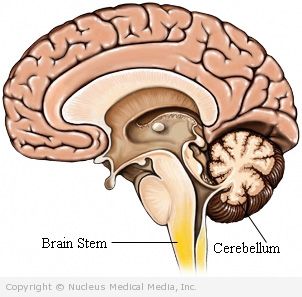Narcolepsy – Definition
Narcolepsy is a disorder of the nervous system. It results in frequent, involuntary, episodes of sleep during the day. Sleep attacks can occur while you drive, talk, or work.
Narcolepsy – Causes
The cause is unknown. It is thought to have a genetic link. There is increasing evidence that it may be an autoimmune disorder. In this type of disorder the body’s own immune system attacks a part of the brain.
Narcolepsy – Risk Factors
A risk factor is having family members with narcolepsy.
Narcolepsy – Symptoms
Symptoms usually start during the teenage years. Onset may range from 5-50 years old. Symptoms may worsen with aging. They may improve in women after menopause.
Symptoms include:
- Excessive daytime sleepiness
- Daytime involuntary sleep attacks
- Unrefreshing sleep
- Sudden loss of muscle tone without loss of consciousness (cataplexy)
- Temporary paralysis while awakening
- Frightening mental images that appear as one falls asleep
- Memory problems
- Symptoms may be triggered by:
- A monotonous environment
- A warm environment
- Eating a large meal
- Strong emotions
Narcolepsy – Diagnosis
The doctor will ask about your symptoms and medical history. A physical exam will be done. If narcolepsy is suspected, you may be referred to a specialist in sleep disorders.
Tests may include:
- Multiple sleep latency test (MSLT) — measures the onset of rapid eye movement sleep, which occurs earlier than normal in narcolepsy
- General sleep lab study — often done the night before an MSLT; helps to rule out other causes of daytime sleepiness by monitoring:
- Brain waves
- Eye movements
- Muscle activity
- Respiration
- Heart beat
- Blood oxygen levels
- Total nighttime sleep
- Amount of nighttime REM sleep
- Time of onset of REM sleep
- Degree of daytime sleepiness
Narcolepsy – Treatment
Treatment may include:
- Stimulant medicines that increase levels of daytime alertness, such as:
- Methylphenidate
- Dextroamphetamine
- Methamphetamine
- Modafinil
- Armodafinil
- Gamma-hydroxybutyrate (GHB) — for excessive daytime sleepiness and cataplexy, such as sodium oxybate
- Antidepressants — to help treat many symptoms of narcolepsy (eg, cataplexy, hallucinations, sleep paralysis)
Other treatment options include:
- Planned short naps throughout the day
- Counseling to cope with issues of self esteem
- Wearing a medical alert bracelet or pendant
Narcolepsy – Prevention
There are no guidelines for preventing narcolepsy. But, you can try to prevent symptoms by:
- Exercising on a regular basis
- Getting adequate sleep at night


